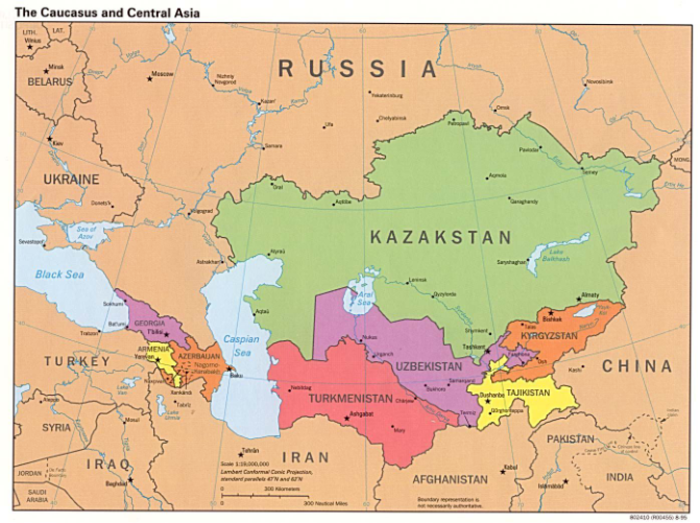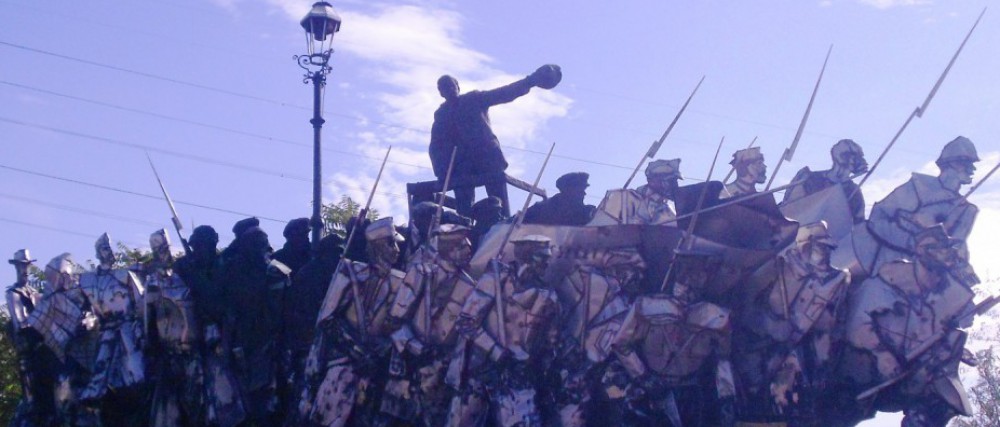Two strongmen met in Kazakhstan, but one is now much stronger than the other. Turkish Prime Minister Recep Tayyip Erdogan met in Astana on September 12th with Vladimir Putin at the clunkily named Conference on Interaction and Confidence Building Measures in Asia. The balance of power between the two has been turned in Erdogan’s favor due to Putin’s disastrous decision to invade Ukraine and the continued failures of the Russian military on the battlefield there. It is cliche to say that power abhors a vacuum, but like all cliches it is built upon a foundation of truth.
Erdogan seeks to expand Turkish influence in the Caucasus and Central Asia with nations predominantly populated by Turkic peoples. Meanwhile, Putin grasps for a lifeline to save his faltering regime and salvage a semblance of success from his ill-conceived war. To that end, Erdogan is said to be offering his services as a mediator between Ukraine and Russia. Erdogan is not doing this out of the goodness of his heart or because he considers Putin a “dear friend”, as he often refers to him. Rather like all strongmen who play power politics, Erdogan sees an opportunity to promote his own interests at the expense of others. In this case, Erdogan can strengthen Turkish power in the region, while Russia is weakened by the war.

Geopolitical Chess – Filling The Void
The geopolitical chessboard in Central Asia and the Caucasus is in the process of undergoing its greatest transformation since the collapse of the Soviet Union. After the latter dissolved, no less than eight independent nations (Armenia, Azerbaijan, Georgia, Kazakhstan, Uzbekistan, Turkmenistan, Kyrgyzstan and Tajikistan) arose from the ashes of that fallen empire. The process of nation building was schizoid and chaotic as these states attempted to establish themselves. This was particularly true during the 1990’s. Russia could not afford to assert itself in the region due to domestic difficulties. China was on the rise, but nowhere near as powerful as it is today. The western world led by the United States involved itself up to a point, especially with developing energy resources in Azerbaijan and Kazakhstan. The region’s geographical characteristics of land locked nations covered by massive mountain ranges and limitless steppe land defeated American attempts to assert greater influence.
Instead, westerners learned to ignore prolific human rights abuses, dictatorial governments and myriad ethnic conflicts to focus on shared economic and security (anti-terrorism post 9/11) interests. After Vladimir Putin rose to power and stabilized Russia, the Kremlin set about reasserting their authority in the region. They re-established old Soviet era economic ties and supported like-minded governments and rulers through financial inducements and military means. This drew many of these nations back into the Russian sphere of influence. Putin took every opportunity to project power showcasing Russian strength in the region.
One of the most striking examples of this occurred in 2008 when the Russian Army invaded Georgia. This led to the unseating of Georgia’s pro-western prime minister Mikhail Saakashvili and the creation of two pro-Russian separatist statelets in South Ossetia and Abkhazia on Georgia’s territory. In retrospect, this was a dress rehearsal for Russia’s annexation of Crimea and support for separatism that led to war in the Donbas region of eastern Ukraine in 2014. Putin demonstrated that he would do everything possible to undermine pro-western governments being established in former Soviet territories. The Baltic states did not figure into this strategy, because by the time Putin took power, Estonia, Latvia, and Lithuania, were too far gone for Russia to try and alter their democratic structure. Anywhere governance and institutions were weak, Russia was able to fill part of the void.

Shared Interests – The Turkic World
Putin’s efforts were largely successful in keeping the Caucasian and Central Asian states in the Russian sphere of influence. The greatest challenge to Russian influence came from a fellow authoritarian regime in China. Xi Jinping’s Belt and Road Initiative facilitated greater connections between China and the area, binding them through shared economic interests. China was able to finance projects and offer loans to nations in the region that would otherwise have been unavailable to them. This has led to major upgrades in infrastructure. Putin had little choice but to allow this. China’s economic might and powerful geopolitical position trumped Russia’s historical ties. From the Kremlin’s perspective this was easier to stomach since China’s government is anti-western and dictatorial.
The other external threat to Russia in the region was and still is Erdogan’s Turkey. After the Turkish strongman cemented his power at home, he looked to the area as one where fellow Turkic peoples would welcome their ethnic brethren’s involvement. Erdogan envisaged a greater Turkish world with himself at the helm. His interest was somewhat different from Putin’s wants to create a neo-Russian empire. For Turkey, the massive energy resources found throughout the area are essential to their economic well-being and national security. Turkey has extremely limited energy resources. They import most of the fossil fuels which power their economy and keep the lights on in Anatolia. While Russia can provide them much of what they need, the Turks would rather deal with nations that are less powerful and more trustworthy. It gives them greater leverage in negotiating favorable trade and military deals. In turn, such states as Azerbaijan and Kazakhstan see the Turks as leverage against undue Russian influence. Azerbaijan also has been able to hedge Turkish support to get the upper hand in their continuing struggle with Armenia over the disputed territory of Nagorno-Karabakh.

Projecting Power – Centers of Influence
The Russian recession from the Caucasus and Central Asia is just beginning. Putin’s war in Ukraine has gravely weakened Russian influence in the region. China and Turkey are prepared to fill the vacuum in power. Erdogan’s positioning himself as a mediator in the Ukraine-Russia war is a master stroke of diplomacy that will strengthen Turkey’s foreign policy. The rewards could be vast. Turkey should be able to expand its influence over one of the world’s richest areas in natural resources. The Turks will be projecting power outward, while Russia will be focused on the internal tumult caused by Putin’s War in Ukraine.
Erdogan is cultivating Russia for trade and economic development as many of their more dynamic businessmen relocate their operations to Turkey where the business environment is much more congenial. With an election due to be held in Turkey next year, Erdogan needs help boosting the Turkish economy where inflation is running at the alarmingly high rate of eighty-four percent. In the near term, friendly relations with Russia can help Erdogan domestically. It is hard to believe that this friendship will prove enduring. Erdogan is using Putin to get what he wants. The weaker Putin gets, the more Erdogan will take. This is all part of a generational transformation in the regional balance of power that will accelerate in the years to come.
Click here for: Declaration of Appeasement – Emmanuel Macron Goes Non-Nuclear (The Russian Invasion of Ukraine #219)



